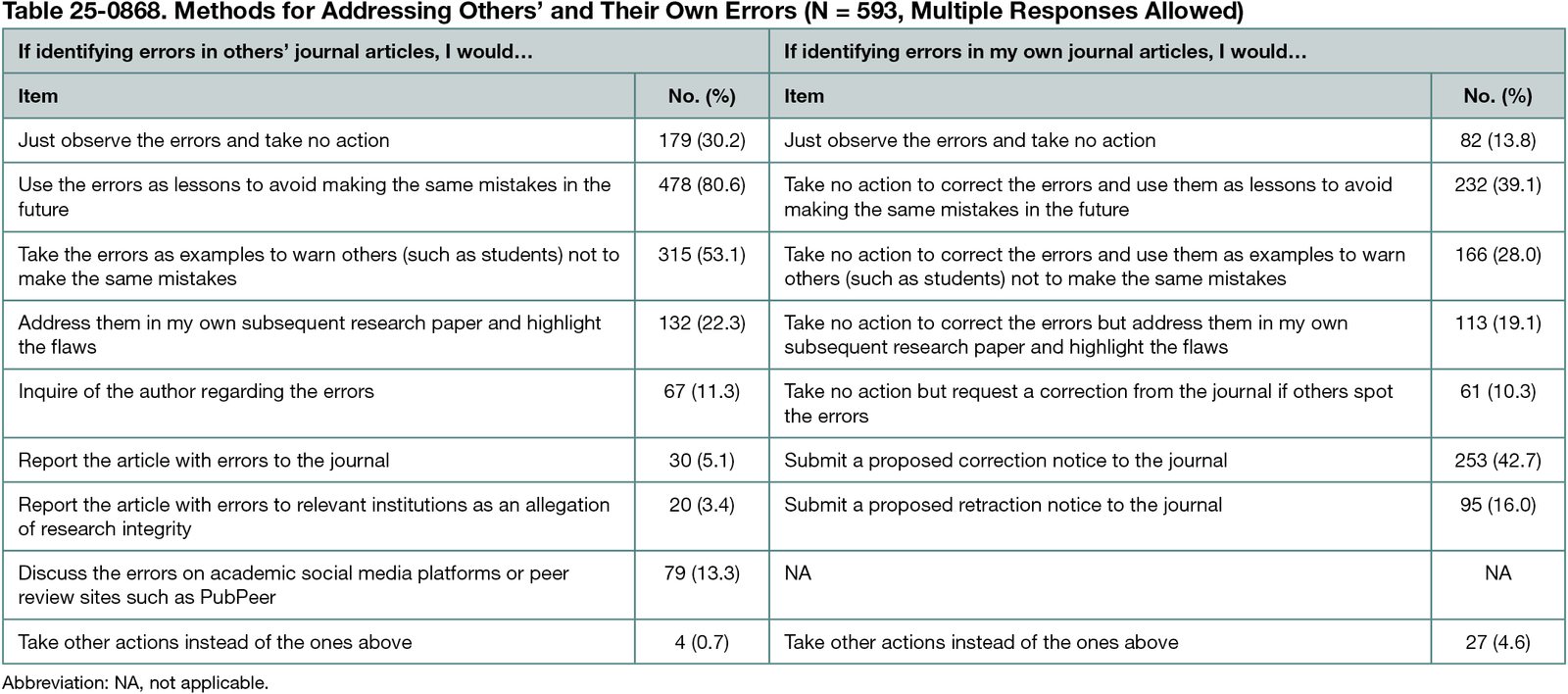Taiwanese Researchers’ Perceptions of Errors and Their Coping Strategies
Abstract
Chien Chou1
Objective
This study surveyed how frequently Taiwanese researchers identify errors in others’ journal articles and their own, as well as how they address these errors.
Design
This cross-sectional study used a self-designed questionnaire from June to December 2023, categorizing errors into 7 dimensions: research design (6 items), data and information (8 items), writing and citation (12 items), authorship (2 items), conflicts of interest (2 items), journal publication (3 items), and others (1 item), totaling 34 items.
A 4-point Likert scale (often, occasionally, seldom, and never, ranging from 4 to 1) was used. The error-addressing methods were presented as questions, allowing multiple answers. Using snowball sampling, this study collected 593 valid responses from Taiwanese professors and researchers (312; 52.61%) as well as from PhD students with publication experience (281; 47.39%). Ethics approval was obtained from the National Yang Ming Chiao Tung University institutional review board before data collection. Content validity of the survey was confirmed by experts.
Results
The participants reported a higher frequency of identifying errors in others’ articles than those in their own (t = 17.88; 95% CI, 0.35-0.43; Cohen d = 0.67; P < .001). Regarding identifying others’ errors, 22 items had a mean frequency above the theoretical mean of 2.5, in the categories of occasionally and seldom. The item with the highest frequency was spelling errors/omissions, followed by errors in the understanding or application of theory. For identifying one’s own errors, only the item spelling errors/omissions reached the theoretical mean of 2.5. The other 33 items, such as misunderstanding of previous research and errors in understanding theory application, ranged from 2.34 to 1.92, corresponding to seldom and never. In terms of addressing errors (multiple responses allowed; see Table 25-0868), 478 participants (80.6%) indicated that if they identify others’ errors, they would use them “as lessons to avoid making the same mistakes in the future,” 315 (53.1%) would take the errors “as examples to warn others,” and 179 (30.2%) would “just observe the errors and take no action.” As for addressing their own errors, 253 participants (42.7%) would “submit a proposed correction notice to the journal,” 232 (39.1%) would “take no action to correct the errors and use them as lessons,” 166 (28.0%) would take no action and use the errors “as examples to warn others.”

Conclusions
Taiwanese researchers tend to identify errors more frequently in others’ work, viewing their own errors as cautionary examples for themselves rather than warnings for others. While correcting errors is a positive step, the tendency to be observant of others’ errors and more reflective to correct their own suggest that Taiwanese researchers tend to take errors more personally. The finding highlights the Committee on Publication Ethics principles of transparency and underscores the significance of upholding research integrity.
1Institute of Education, National Yang Ming Chiao Tung University, Hsinchu, Taiwan, cchou@nycu.edu.tw.
Conflict of Interest Disclosures
None reported.
Funding/Support
This work was supported by the National Science and Technology Council, Taiwan (MOST110-2511-H-A49-008-MY4 and NSTC113-2750-V-A49-001-MY2).
Role of the Funder/Sponsor
The funder provided financial support only and had no role in the preparation of the abstract proposal.
